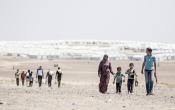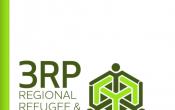Lebanon
Operation: Lebanon
Location
Latest update of camps and office locations 13 Jan 2016. By clicking on the icons on the map, additional information is displayed.
Key Figures
| 2015 end-year results | |
| 70% | of refugee households received cash and vouchers in the winter months |
| 60,000 | people were supported with life-saving hospitalizations, including for deliveries |
| 59,000 | children benefitted from co-financing of their school fees for the 2014-2015 school year |
| 19,300 | people were submitted for humanitarian admission and resettlement |
| 2016 planning figures | |
| 18,000 | non-Syrian refugees targeted for registration on an individual basis |
| 98,860 | Syrian refugees and asylum-seekers targeted to have access to secondary and tertiary health care |
| 118,980 | Syrian primary school-aged refugees and asylum-seekers targeted for enrolment in primary education |
| 30,205 | Syrian refugee and asylum-seeker households targeted to receive basic domestic items |
| 84,150 | Syrian refugees and asylum-seekers targeted to have access to legal assistance |
Latest Updates and Related Links
People of Concern
2015
| 2015 | 1,088,231 |
| 2014 | 1,167,179 |
| 2013 | 862,526 |

Budgets and Expenditure for Lebanon
- 2014
- 2015
- 2016
Working environment
- The protection environment for Syrian refugees in Lebanon became less favourable in terms of access to territory, residency and registration.
- Refugees saw their savings depleted, and their socio-economic vulnerabilities increased dramatically.
- Due to the existing regulatory framework on livelihoods, refugees had limited access to formal employment.
- Resettlement remained the only durable solution available.
Population trends
- Lebanon continued to host the highest number of Syrian refugees in the world in proportion to its population size.
- Following increased border restrictions, the suspension of registration and inactivation of files of registered refugees deemed to be no longer present in the country, there was a net decrease of some 77,000 in the number of registered Syrian refugees.
- The number of individuals from countries other than the Syrian Arab Republic, mainly Iraqis, registered with UNHCR increased by approximately 1 per cent when compared to 2014.
Achievements and impact
- Intensive outreach contributed to the enrolment of some 158,500 refugee children for the 2015-2016 school year.
- More than 500 refugee outreach volunteers were mobilized, facilitating two-way communication with refugees across the country.
- With the Ministry of Social Affairs, more than 31,000 refugees were counselled on national birth registration procedures, contributing to the prevention of statelessness.
- Inter-agency work resulted in nearly 36,000 vulnerable families receiving regular multipurpose cash assistance from UNHCR and other partners.
- Basic assistance for refugees of all nationalities was aligned to ensure equity and efficiency.
Unmet needs
- By year end, only 20 per cent of the refugee population deemed to be highly or severely vulnerable received monthly multi-purpose cash assistance.
- UNHCR could only cover 75 per cent of the costs of emergency life-saving hospital interventions.
Working environment
The impact of the Syrian crisis – including on the economy, demographics, political instability, and security – continues to deepen across Lebanon. With more than 1.3 million refugees expected by the beginning of 2015, Lebanon’s exceptional hospitality will be extremely stretched.
The Government has established an inter-ministerial crisis cell, confirming its pro-active engagement in refugee issues. While the country is not party to the 1951 Refugee Convention, and despite restrictions imposed at the border, it is expected that Syrians in need of immediate protection and assistance will continue to find safe haven in Lebanon.
Refugees have access to most basic services through public institutions, where the authorities continue to play an active role in facilitating response coordination and planning.
Syrian refugees, like the Lebanese in local communities most affected by the influx, are becoming increasingly vulnerable, despite the large-scale inter-agency response to date. Humanitarian needs show little signs of abating. As their displacement extends and their savings deplete, refugees’ socioeconomic vulnerability increases.
An effective display of international solidarity and support is vital for Lebanon, which has received the highest number of Syrian refugees in the world. Failing this, the country’s capacity to respond and withstand the Syria crisis will be severely tested.
Needs and strategies
UNHCR’s overarching strategy in Lebanon remains to protect, assist and facilitate solutions for refugees and other people of concern, through close partnership with the Government, the judiciary, the UN Country Team, donors, NGOs and partners, and the refugees themselves.
UNHCR will focus its activities on: the overall coordination of the Syrian refugee crisis; registration; protection monitoring and outreach activities; resettlement and humanitarian admission; provision of cash grants, shelter and access to health and education. Moreover, together with partners, the Office will support host communities and authorities to mitigate the direct impact of the presence of the refugees in order to ensure a more favourable protection environment. UNHCR will support the Government in improving central and local actors’ ability to provide refugees with basic services, as well as to prevent statelessness in Lebanon. Finding solutions outside of Lebanon for the most vulnerable refugees will remain a priority.



